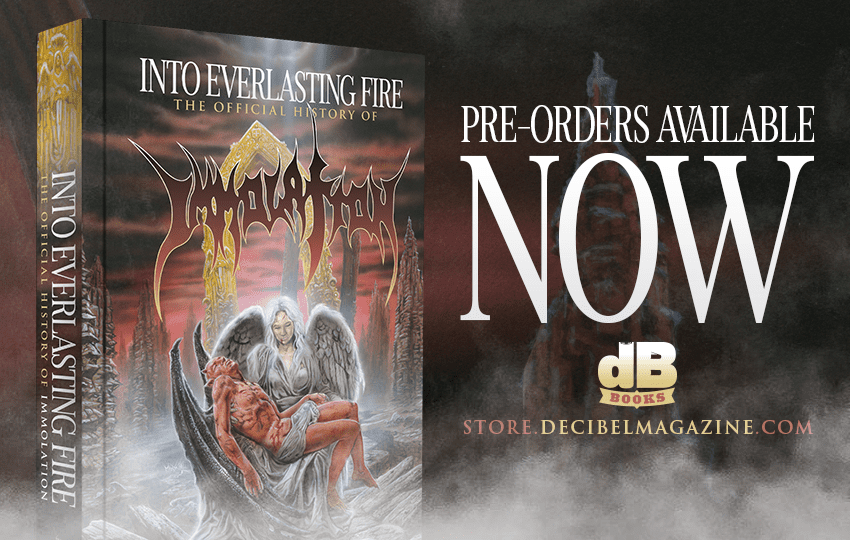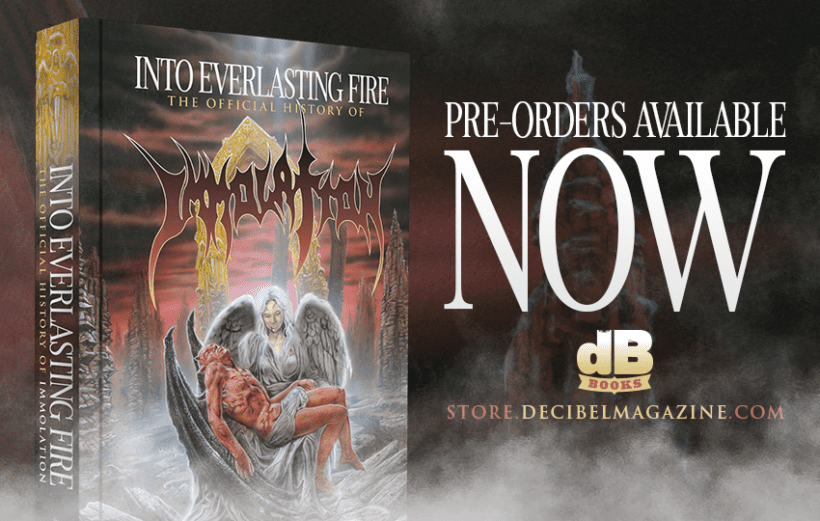
Decibel Books is proud to announce the publication of Into Everlasting Fire: The Official History of Immolation, a massive 400-page history of one of the most beloved bands in death metal history. Fans can pre-order their copy now here with an expected ship date in November.
Propelled by the dissonant harmonic acrobatics of guitarist Robert Vigna and the subterranean growl and slashing rhythms of bassist/vocalist Ross Dolan, Immolation’s core duo not only led death metal landmarks like Dawn of Possession but piloted the band through music industry pitfalls of dubious record contacts, sketchy agents and the mid-’90s commercial collapse of the subgenre they helped perfect—and never abandoned.
Into Everlasting Fire: The Official History of Immolation provides eyewitness accounts from ex-members, label owners, producers and fellow artists who were part of the band’s relentless climb to the top of the modern death metal landscape. Penned by longtime extreme metal journalist Kevin Stewart-Panko (Do You Have Anything to Declare?), featuring a foreword by Deadguy guitarist Keith Huckins, and boasting stunning new art from legendary Immolation cover artist Andreas Marschall, Into Everlasting Fire is Immolation’s fully authorized, unprecedented look into the band’s career via countless in-depth interviews, studio recollections, harrowing and hilarious road stories and dozens of exclusive photos.
“We are very excited and extremely proud to announce Into Everlasting Fire,” says the band. “It provides a unique glimpse into our world throughout the years as well as a glimpse into our scene from its earlier beginnings right up until the present. Kevin Stewart-Panko did an amazing job in assimilating almost 40 years of stories and memories into a book that will finally give our fans a unique look into Immolation’s long and rich history rooted in the beginnings of the death metal scene.”
At over 400 pages (including a 16-page color image section) pre-order this gorgeous hardcover now exclusively through Decibel Books.
For an exclusive preview of Into Everlasting Fire, fans can read the first excerpt online, which takes readers back to early ’90s as the death metal scene was about to explode, and the Immolation were about to sign to their first record deal with Roadrunner subsidiary R/C Records.
——————–
To this day, Ross Dolan and Bob Vigna regret losing touch with Kim August. The former Ultimatum fanzine editor may not have ever been officially anointed as Immolation’s manager (in an interview in issue #8 of Slayer Mag, which ran in the spring of ’91, after singing the band’s praises, she responded, “I don’t know…I guess you’d have to ask Ross if I’m still managing Immo”), but she worked hand over fist to connect the band with the people and players that helped to take them out of their practice space, put them in contact with similar thinking national acts, and ultimately played a role in getting them into the face and ears of the man who would sign the band to their first recording contract.
In Decibel’s online feature celebrating 30 years of Dawn of Possession, Dolan said, with a measure of lament, “She was the first American to write to us. Right around when we released our 1988 demo. She helped us out in the beginning. Almost managed us in a way. Well, that’s probably pretty loose, but she definitely helped out promoting us and the scene. She was awesome. Cool as shit. Super into the music. It’s a shame we haven’t stayed in touch. I mean, we haven’t heard from her since, like, 1991.”
In the midst of their post-European trip wood-shopping and writing sessions, before taking the stage at A Day of Death and playing a handful of local and out-of-state shows, Immolation received a letter from Roadrunner A&R wunderkind Monte Conner. Actually, the letter was the second Conner addressed to the band, but it was the first that Immolation acknowledged.
“We got a letter from Monte Conner shortly after the ’89 demo came out because Kim gave Monte our contact,” Dolan recounts. “She did a lot to facilitate our growth back then in small ways that had a lot of impact, including turning us onto Monte, who was Roadrunner’s main A&R guy. He wrote us and we just kind of shrugged it off.”
“I don’t remember what the first letter said,” Vigna maintains, “but we definitely thought two things: one, that we weren’t ready, and two, that this couldn’t be for real. So, we just kind of disregarded it. Maybe at the time and with the bands that were on Roadrunner—because that was before the whole death metal thing really hit—we were like, ‘They’d never sign us.’ It was the second letter that got our attention. That was the one we put inside the Stepping on Angels…Before Dawn CD where, Monte basically said that Roadrunner was interested in working with us, but not responding to them was no way to go about getting signed. At that point, we were like, ‘Maybe we should reach out to this guy.’”
Vimana/ex-Cephalic Carnage guitarist Zac Joe has a long history as both a fan, friend and touring partner of Immolation’s. Thirty-three years down the line, Joe remains impressed by the band’s initial repudiation of Conner’s approach and has drawn power and positivity from the way Immolation didn’t say ‘How high?’ when Conner said ‘Jump’ and others were jumping. “I remember on a tour when we stayed at Bob’s house,” he laughs. “He had the letter from Monte Conner framed and up on the wall!”
To the contrary and despite how it appeared on the surface at the time, Dolan and Immolation weren’t exuding quantities of confidence. Instead of walking with their shoulders ramrod straight and chests puffed out—despite the improvements they had admittedly made—they were still swimming in self-doubt. They may have begun the process of chipping away at their insecurity, but the belief that their band was not ready to take the next step was still lurking in the background.
“That was the thing with Earache as well,” Vigna says. “We weren’t feeling like we were ready or set yet because we didn’t have enough songs and we needed to get more stuff together. By the time we got the second demo out, it didn’t hit Digby as hard and he wasn’t really as interested anymore.”
“The second demo was different in a lot of ways,” explains Dolan. “It had a cleaner production and it was better produced. I remember when Carcass first came to the States and we saw them at G-Willikers. They were opening on Death’s Spiritual Healing tour and when we met them, they were already familiar with the ’89 demo. We were talking to them about it and maybe signing with Earache and I remember those guys saying they thought the production was really good and that it sounded good. We were encouraged by that because Symphonies of Sickness was my favorite album of the time; when that came out, I listened the shit out of it.”
In Monte Conner’s eyes, Immolation was ready to join the family alongside recent Roadrunner successes Obituary and Sepultura, and latest signees Deicide, all of whom he had worked with since making the quick move from radio promotion at Roadrunner to A&R and introducing hundreds of thousands of metalheads here and abroad to the sounds emanating from the death metal underground. Conner himself recalls falling into A&R by accidental design. Roadrunner was his second industry gig, his first being a nine-month stint at New York-based Shatter Records doing college radio promotion.
“The biggest artist we had at Shatter was Paul Di’Anno’s Battlezone,” says Conner. “We had Rhett Forrester, Attila, a band called E-X-E and a few other things, but it was a tiny little label that was struggling financially the entire time I was there. I started doing college radio promotion. Back then, that was a very easy entry-level position. It was college radio, and anybody could do it; you were the same age as the kids you were calling to talk to about music and trying to get your band on their playlists. I was basically calling people like me in the position I was in when I was in college doing my own radio show.”
After departing Shatter, Conner was hired by Roadrunner for the same radio promotions gig, but in the back of his mind, he wanted to do more. Within a few days of starting at Roadrunner, he was able to move into the A&R position as a result of fortuitous timing and a bit of luck.
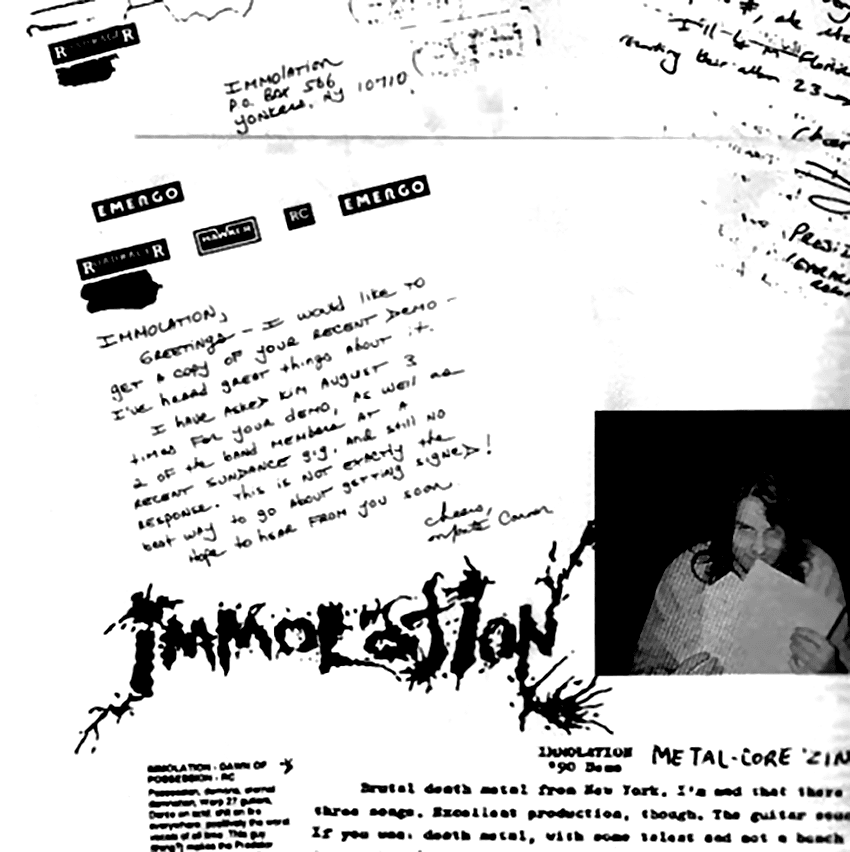
“I’d always had aspirations as an A&R guy because I knew what I was doing,” he says. “In fact, the whole time I was working at Shatter, I would find bands and try to get the owner to sign them. Literally, a week after I got to Roadrunner, the woman who had brought me into the company, Holly Lane, wound up quitting all of a sudden to go from Mechanic Records with Steve Sinclair. We were an office of four or five people back then and I was the only one in the office who was living the music. I was young and a real-life metalhead; it was just a job to everyone else who worked there. The owner of the label, Cees Wessels, looked around at who was going to do A&R, and he let me try it because he knew I was plugged in and that I had aspirations to do that. I never wanted a radio promotion job. I wanted to do A&R, but I didn’t have any experience in that area.”
Conner was hired at Roadrunner Records on December 21, 1987. After the Christmas holidays, the first thing he did was he started signing death metal.
“Sepultura and Obituary were my first ever signings,” he says, “and once Beneath the Remains and Slowly We Rot came out in May of 1989, they pretty much blew up right out of the gate. From the beginning, they did really well, and it opened the floodgates at Roadrunner to continue to bring in more death metal, and I had the support of Cees. I was on a complete spree at that point; by the end of 1989, I was looking to grab any death metal I could get my hands on—Malevolent Creation, Sorrow, Gorguts… it was the heyday of Roadrunner death metal.
“As far as when and how I found Immolation,” he continues, “I don’t remember if it was the first demo or not, but I was super-plugged in and had my ears to the ground. The reason I would have gone after Immolation was because I wanted to sign more death metal. They were a local band I was reading about in fanzines and there was a buzz on them. But I had never seen them live; I only heard them on a demo tape. Thinking back, I do remember Kim August’s name as a contact because she was managing or helping them back then.”
About the first letter Conner sent the band, he recalls that “I probably sent the initial letter to Kim” and shares the opinion with Immolation that they either didn’t think his inquiry was genuine or that they couldn’t believe anyone would be interested in them at that stage of their game.
“So, I wrote them a second letter that they loved and said something like, ‘Guys, this is not the way to go about getting a deal.’ Typically, when you’re doing A&R and write to a band and they get a letter, they fucking freak out and jump right on it. It’s a big moment. But those guys just ignored me,” he says with a chuckle.
Conner regularly posts interesting tidbits and stories from the history of hard rock and metal on his Facebook page, both exclusive to his 35-year career in A&R and not. In one particular look back through the sands of time, he wrote the following about his experience in signing Immolation:
“Fun fact: In 1990, in the days before email and cell phones, I was chasing the band to potentially sign them. I was getting nowhere so I decided to try my hand with a letter that read: ‘I would like to get a copy of your recent demo—I’ve heard great things about it. I have asked Kim August three times for your demos, as well as two of the band members at a recent Sundance gig, and still no response. This is not exactly the best way to go about getting signed!’ Wouldn’t you know it—the cheeky bastards proudly displayed that letter inside Stepping On Angels…Before Dawn. Truth be told, Immolation have always done things their own way, and on their own schedule, and that is part of why they are still going strong to this day.”
Doing things their own way may or may not have included playing hard to get with one of the increasingly bright business stars of the metal underground, but it worked. Conner denies falling for it, but basic human psychology will tell you that you always want what you can’t have; how, for example, efforts to address unrequited love are often grander than the actual expressions of love. There’s merit in seemingly throwaway sayings like “Absence makes the heart grow fonder” and “The chase is better than the catch.” It’s highly unlikely Conner was immune to feelings of being spurned and needing to investigate the why behind being shunned by a bunch of dudes from his own backyard. More so, considering that in light of the success of Sepultura and Obituary, he was being inundated with demos from bands he didn’t think were up to Immolation’s snuff.
“I don’t know if their playing hard to get made me want to get them more,” he says coyly, “but I was reading all the fanzines back then and that was my information network to learn about new bands. When you’re an A&R guy, you don’t just wake up one morning, and a light bulb goes off, and the band is there. The way you find out about bands is through your network of contacts and that could be a local booking agent, a local DJ, a record store or, in my case, by actively reading fanzines. Immolation had a really high profile and I’d see their name around New York. Another factor was that Roadrunner was having real success with death metal at that point and I was looking to grab up a bunch more. It naturally made sense to approach them.”
The success Conner was having following the release of Beneath the Remains and Slowly We Rot meant that he had his boss’ blessing to get out there and find more bands to add to that success. But only to a limited extent. Roadrunner owner Cees Wessels was a businessman who was more a fan of money than he was of music and even though Conner had proven himself and was given greater autonomy to find whoever he could that would fill Roadrunner’s coffers, there were still reins and restrictions he had to skate around in order to have potential signees approved by the shadowy entity that was his boss.
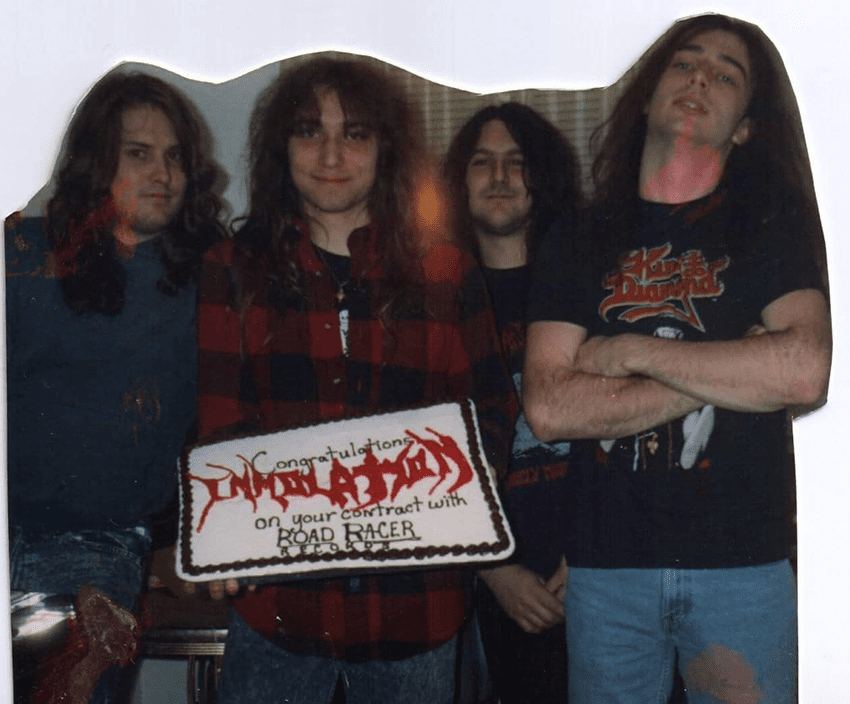
“Cees Wessels is a legendary guy,” says Conner. “You’ve probably heard his name a million times, but he was also legendary for being behind the scenes. You’d have a hard time finding a picture of or an interview with him. He never wanted to be in the public spotlight. So, because I was the guy out on the front lines representing Roadrunner and signing the bands, doing interviews and so on, people thought I was the owner of Roadrunner. People didn’t understand I just worked there; I reported to Cees and every band that I signed in my entire 25-year career at Roadrunner had to be okayed by him. Naturally, it makes sense that as a new A&R guy and a 24-year-old kid with no track record that, of course, I would have to have somebody like him approve it. But amazingly, even years later, when I had tremendous success and was a star A&R guy, he still had to approve it. I still never had the autonomy to totally do what I wanted at Roadrunner. Everything I did at the label was running the gauntlet of his approval. There were plenty of bands we missed out on because he said no.”
As it pertains to the process of courting and signing Immolation, Conner recalls taking advantage of the currency he had amassed via his early signing successes and Wessels’ ivory tower understanding of the albums his label was releasing: Distorted guitars? Check! Growly vocals? Check! Countercultural imagery and message? Check! Did all that combined just sell six figures? Check! It all added up to Conner not having to dig too deep into his powers of persuasion and convincing to get Wessels to sign off on Immolation.
“We had A&R meetings,” Conner remembers. “Cees was in New York every two weeks. It was really incredible how much time he spent here; he was so serious about the U.S. label and launching it that he invested a ton of time and was in New York all the time. We always had meetings and I would have played him their demo to get his approval, but I can’t tell you anything about how he reacted; that’s all been lost to the sands of time. But whether he liked Immolation or not when I played it at the A&R meeting, he would have recognized it as something cool, that it was death metal, that I felt good about it, that it wasn’t an expensive deal. He would have gone with the flow.”
Very quickly after Immolation finally addressed their suitor, what Dolan describes as “a long-ass contract” appeared in the mail. In what has become typical fashion, Immolation didn’t excitedly gloss or hurriedly skim over the details of the seven-album deal like most rookie bands would and sign their lives away without thinking about it. Sure, the deal was heavily weighted in Roadrunner’s favor—good luck finding a record deal that doesn’t have odds leaning towards the house—but Immolation at least took the time to hire someone with experience to pull apart the contract so that they were only getting somewhat screwed, not entirely screwed.
“There were three different parts,” Vigna explains. “I don’t know how they do it now, but back then, it was like a recording contract, a publishing contract and a merchandising deal. It was all-inclusive, but any touring income was left alone.”
“We had a friend of ours look at it,” says Dolan. “This is a crazy story: we had cats growing up and the guy who was our vet, this guy named Richard, was in the music industry when he was younger. He knew an entertainment lawyer he was friends with and had worked with in the past. We were at the vet one day, taking our cats in for their check-up. I was talking to him and he said, ‘Hey, your mom said you guys have had some interest from a record label. I have this good lawyer,’ and he put us in touch. We gave the contract to this guy—his name was Jack—and the negotiations started. Since we were a young band with only two demos behind us, we didn’t have much wiggle room, but at the end of the day, we signed a seven-album contract with them. They wound up not owning all of our publishing; I think it was a 50/50 split that Jack was able to get us, which was better than a lot of bands got. The merch deal had a clause in it that allowed us to seek out a third party if they could beat their prices for touring merchandise. Blue Grape, which was Roadrunner’s merch arm, would print up stuff for retail and our shirts in Europe, but in the U.S., we were able to do our own thing if we could beat their prices for tour merch.”
A seven-album deal that involved the three recording, publishing and merchandising subsections was the standard deal Roadrunner offered their first-time bands. Conner, who brokered deals for countless bands during his tenure at the label, doesn’t deny that the Roadrunner offer was “notorious and really, really strict,” but claims it’s still better than the modern-day “360 deal” that many record companies table. Three hundred sixty deals—as in 360 all-encompassing degrees—are designed for labels to gain even more of a financial stake in all of a band’s revenue streams in light of the revenues that have been lost since the internet came into the picture and eviscerated retail sales.
“Our deals didn’t include any participation in touring and would have been more like a 270 deal,” he reasons. “They weren’t actually called 270 deals; they weren’t called anything. Any band that I signed I signed them for records, merch and publishing. Keep in mind it’s misleading; it’s not like the band just signed this shit over to us. They were paid on their merch and paid on their publishing. It wasn’t like we were stealing from them; we were just saying, ‘We don’t want you to sign with another publishing or merchandise company.’ They were forced to do it through us because Cees figured it was because of the efforts of Roadrunner and his investment in the band that their merchandise and publishing had any value. So, why shouldn’t he make money off of it instead of a stranger?
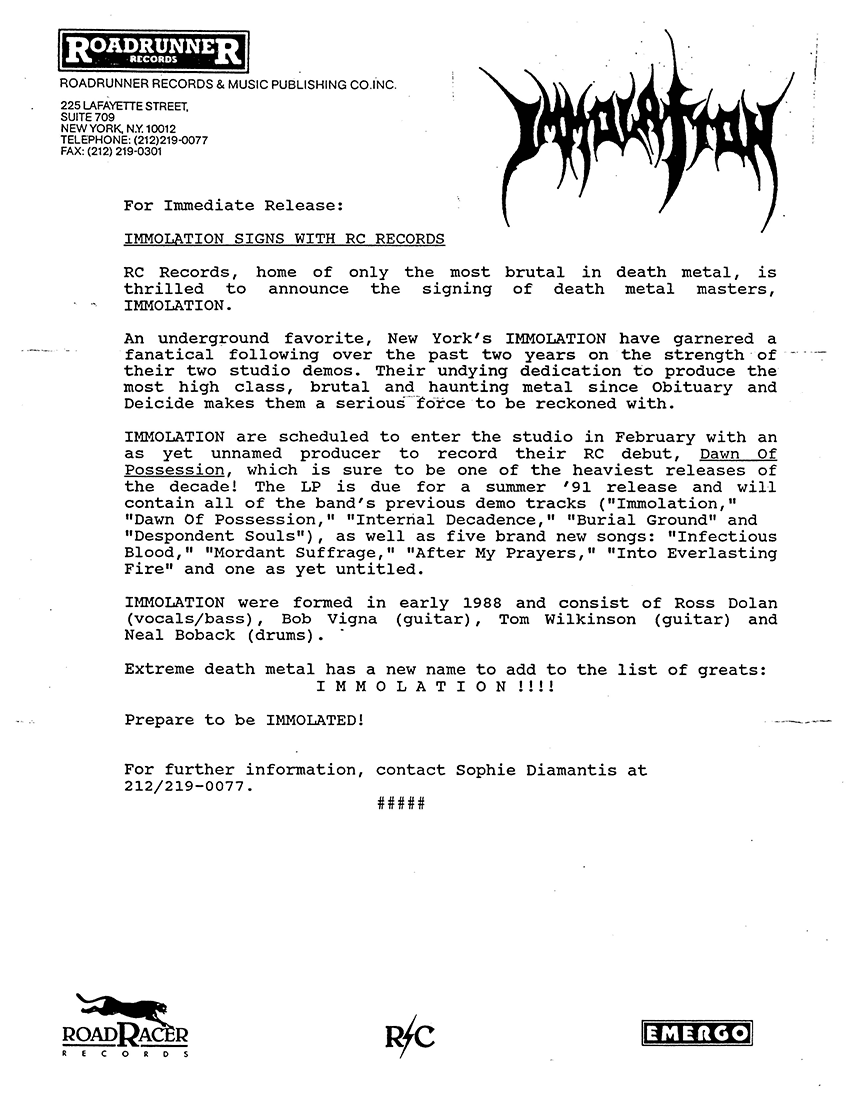
“And another thing,” Conner adds, “is that these were not license deals. These days, labels do license deals. So, let’s say I sign Obituary and it’s a 12-year license deal. After 12 years, the band gets the record back and they can put it out themselves or sell it to another label. The Roadrunner deals were ownership deals where Roadrunner outright owned the record for life. That’s why the band is never going to get Dawn of Possession back because they signed lifelong rights to Roadrunner, which was eventually sold to Warner Music. So now Warner has those rights. The bands are upset; I’m sure Immolation is furious they’ll never get Dawn of Possession back. They were really tough deals in that regard. The thing is that these bands can complain about it, but they all had lawyers. If we sent a contract to a band and say Immolation was like, ‘Yeah, we’ll sign this,’ we’d always be like, ‘No, don’t sign it yet. You need to get a lawyer involved.’ And most of these bands freely signed the contracts and didn’t have lawyers involved.”
Even though Immolation did get a lawyer involved, they still caved to the pressure of what Conner calls “Roadrunner being the only game in town.” Immolation’s second demo wiped away any of the interest Earache had in the band and, looking back, Dolan doesn’t remember there being a lot of curiosity from elsewhere, as surprising as it seems. Even with a legal eagle in their corner, Immolation went into negotiations without much bargaining power and Roadrunner’s position was essentially, ‘It’s either sign with us or remain unsigned.’
“We were in the position of power with these unknown bands because we were the only label offering,” explains Conner. “For example, if we’re offering a seven-album deal and it’s a competitive situation and Metal Blade is offering three, and Relapse is offering two, the band is going to be like, ‘Fuck off, we’re not signing a seven-album deal. But if we’re the only offer they have… And in 90% of the cases of the bands I ever signed to Roadrunner, I was the only label offering a deal. Roadrunner was notorious for those brutal deals, but those were Cees’ deals; they were not my deals. I was working for him and that was the contract. And because I’m the public face of Roadrunner, people would pin it on me. Don’t kill the messenger.
“But you know what?” he continues, “even though Obituary is never going to get Slowly We Rot and Cause of Death back and Immolation is never going to get Dawn of Possession back, Roadrunner really broke those bands and invested in them. We put those bands on the map and helped give them careers. While they’ll be unhappy that they’re never going to get those records back, they understand they have careers because of Roadrunner.”
Back in the day, before technology advanced and streamlined recording software made it accessible and affordable, home studios were ubiquitous. Anyone could record and distribute their music digitally; signing a record contract was a main goal and a vital step to career in music. With the Roadrunner deal in their pockets, Immolation had made it, so to speak. And they celebrated as one would expect Immolation to celebrate.
“It was a big deal,” remembers Dolan. “We had a signing party that night with the four of us and pizza at Bob’s house. We were going to sign it in blood.”
“Needless to say,” Vigna deadpans, “it ended up being ink.”
Pre-order Into Everlasting Fire: The Official History of Immolation exclusively from Decibel Books here.
